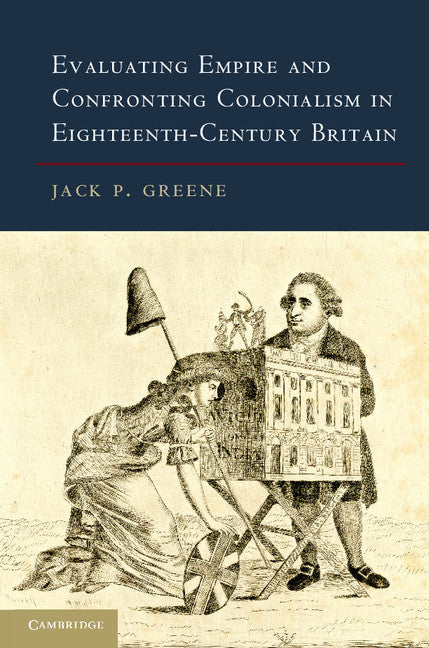Freshly Printed - allow 10 days lead
Couldn't load pickup availability
Evaluating Empire and Confronting Colonialism in Eighteenth-Century Britain
This book analyzes how Britons celebrated and critiqued their empire during the short eighteenth century, from about 1730 to 1790.
Jack P. Greene (Author)
9781107682986, Cambridge University Press
Paperback / softback, published 29 March 2013
404 pages
23.5 x 15.3 x 2.2 cm, 0.58 kg
'An important book on a topic to which historians have not given due attention. Greene has done nothing short of opening up a new subfield of eighteenth-century imperial history. No doubt rich harvests will follow.' Max M. Edling, The Journal of Southern History
This volume comprehensively examines how metropolitan Britons spoke and wrote about the British Empire during the short eighteenth century, from about 1730 to 1790. The work argues that following several decades of largely uncritical celebration of the empire as a vibrant commercial entity that had made Britain prosperous and powerful, a growing familiarity with the character of overseas territories and their inhabitants during and after the Seven Years' War produced a substantial critique of empire. This critique evolved out of a widespread revulsion against the behaviours exhibited by Britons overseas and built on a language of 'otherness' that metropolitans had used since the beginning of overseas expansion to describe its participants, the societies and polities that Britons abroad constructed in their new habitats. It used the languages of humanity and justice as standards to evaluate and condemn the behaviours of both overseas Britons and subaltern people in the British Empire, whether in India, the Americas, Africa or Ireland.
1. 'The principal cornucopia of Great Britain's wealth': the languages of commerce, liberty, security, and maritime supremacy and the celebration of empire
2. Outposts of 'loose vagrant people': the language of alterity in the evaluation of empire
3. 'A fabric at once the dread and wonder of the world': the languages of imperial grandeur, liberty, commerce, humanity, and justice and the American challenge to empire
4. Arenas of 'Asiatic plunder': the languages of humanity and justice and the excesses of empire in India
5. Sites of Creolean despotism: the languages of humanity and justice and the critique of colonial slavery and the African slave trade
6. 'A fruitless, bloody, wasting war': the languages of imperial grandeur. Liberty, humanity, and commerce in the American conflict
7. 'This voraginous gulph of Hibernian dependence': the languages of oppression, corruption, justice, liberty, and humanity and the identification of imperial excesses in Ireland
8. A 'shadow of our former glory'?: The discussion of empire in the wake of American secession
9. Epilogue: 'against every principle of justice, humanity, and whatever is allowed to be right among mankind': standards of humanity and the evaluation of empire.
Subject Areas: Modern history to 20th century: c 1700 to c 1900 [HBLL], British & Irish history [HBJD1], History [HB]


